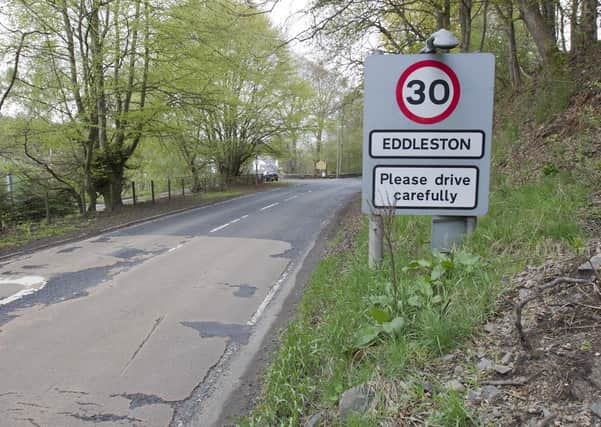Plans to cut 30mph speed limits in Borders by 10mph given go-ahead by councillors


Councillors for the region have agreed to press ahead with proposals for a phased introduction of that 10mph reduction in a bid to curb the severity and frequency of road traffic accidents, as well as to encourage more walking and cycling.
Speed limits will be cut by a third in 80 towns and villages across the region – including Hawick, Selkirk, Kelso, Jedburgh, Peebles, Earlston and Galashiels – initially as an 18-month pilot project.
Advertisement
Hide AdAdvertisement
Hide AdThe first communities to get 20mph speed limit signs put up as part of a phased rollout starting next month will be those that have already been asking for them such as Eddleston, Stow, Coldingham, Sprouston and Newcastleton.
The move is part of the Scottish Government-funded Spaces for People initiative, and it’s being paid for by a £1.2m handout from Holyrood.
A report presented to a full meeting of Scottish Borders Council held via video-link last Thursday, August 28, explained that the forthcoming 33% speed limit cut is intended to reduce the risk and severity of injuries as a result of road traffic accidents.
It is also intended to encourage more Borderers to travel by foot or bike, a shift described as “especially important considering the links between obesity and Covid-19”, according to the report’s author, traffic and road safety team leader Philippa Gilhooly.
Advertisement
Hide AdAdvertisement
Hide AdThe only exception to the new 20mph speed limits will be on trunk roads as Transport Scotland is currently considering such a move itself after carrying out its own research.
That means stretches of the A1, the A7, the A68 and the A702 in the region will be exempt for now, though similar reduced speed limits could follow in due course.
Speaking in support of the motion, Tweeddale East councillor Robin Tatler said: “I’m absolutely 100% in support of this report and the project.
“Over the years, I’ve had a lot of emails from communities who are absolutely desperate for these restrictions to come into place.
Advertisement
Hide AdAdvertisement
Hide Ad“I’ve only had one email in advance of this motion, which I’ve responded to quite robustly, against the proposals.
“To me, it’s an equalities issue. Not everybody has access to cars and so this is levelling things up a bit for pedestrians and cyclists.”
Opposition councillors were broadly in favour of the proposals but spoke out against the blanket approach to lowering the speed limits.
Fellow Tweeddale East councillor Stuart Bell said: “I am supportive of this but concerned about the details.
Advertisement
Hide AdAdvertisement
Hide Ad“While it is good to see that ideas have moved on, I remain concerned about the blanket nature of 20mph proposals.
“I fear a one-size-fits-all approach, while simple to implement, potentially leads to problems.
“20mph zones make good sense in residential areas, where priority should be given to pedestrians and cyclists. They make sense in residential areas where they can be reinforced by street architecture such as chicanes and planters to naturally slow vehicles.
“I stress residential areas and I stress it should be where appropriate.”
Advertisement
Hide AdAdvertisement
Hide AdA report will be brought back to councillors 12 months after the start of the pilot project with suggestions on which reductions, if any, should continue.
The remainder of the trial period will be used to implement any permanent changes agreed on at that point.
To gauge reaction to the speed limit cuts, further comments will be invited from members of the public, the police, councillors and community councils over the next year and a half.
Edinburgh Napier University’s transport research department is to be asked to carry out an independent evaluation of the pilot scheme.